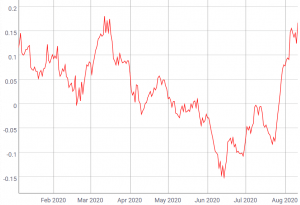Did Russian COVID-19 Vaccine News Crash Bitcoin and Gold Prices?
Following a crash in both gold and bitcoin (BTC) prices yesterday that sent the much-discussed gold-to-bitcoin correlation even higher, the discussion is now on about what caused the sell-off, and whether a Russian COVID-19 vaccine could potentially be hurting the price of both assets.

At the time of writing (09:39 UTC), bitcoin was still down by 2.6% over the past 24 hours, trading at USD 11,459, after a correction that started Tuesday night and continued into the early hours of Wednesday brought it down to the USD 11,200 level before a recovery towards USD 11,500 began. Meanwhile, the price of gold also saw similar declines, dropping steadily over the same time period before somewhat recovering in early Wednesday trading.
Russia said yesterday that it had approved the world’s first COVID-19 vaccine, as the nation’s Ministry of Health issued what’s called a registration certificate for a vaccine candidate that has been tested in just 76 people. However, the vaccine cannot be used widely until 1 January 2021, presumably after larger clinical trials have been completed, according to Science. However, scientists around the world immediately denounced the certification as premature and inappropriate, as it has yet to complete a trial that convincingly shows it is safe and effective in a large group of people, the report added.
Also in Russia, media outlets are asking what a vaccine could do to BTC prices. For some, the concept of avoiding a second wave is vital.
RBC quotes Oleg Abelev, an expert at the Lemon for Tea investment group as stating that while crypto prices rallied this year, that growth could evaporate if the virus-related death toll starts to rise again. A second crypto market dip due to panic selling, he opined, was almost a “100%” certainty.
The media outlet also quoted experts as saying that while an effective coronavirus vaccine could cause volatility in traditional markets – sparking bond sell-offs – BTC is much harder to predict.
RBC stated that the consensus among the experts it spoke to was that a second wave would negatively affect crypto prices, and bitcoin in particular. However, a vaccine could help offset these fears, meaning that BTC’s USD 3,800 low (in March this year) was “probably not going to be repeated.”
Meanwhile, although several other factors than a COVID-19 vaccine may have been the primary driver for the gold sell-off, including modest outflows from gold-backed ETFs (exchange-traded funds) and an unusually overbought reading on the Relative Strength Index (RSI), it seems that hopes for a quicker economic recovery have put some pressure on gold in the short-term.
If the correlation between the two forms of safe-haven assets does hold up, the profit-taking in gold could potentially also extend itself to bitcoin, with the bitcoin-to-gold “realized correlation” recently hitting an all-time high, according to crypto analytics firm Skew.
Bitcoin and gold correlation chart:

“Once [gold] got to USD 2000 per ounce, in a lot of investors’ minds that could have been an opportunity to take profit off the table,” Gavin Wendt, senior resource analyst at MineLife Pty. told Bloomberg. He also added that the news about a vaccine being approved by Russian authorities “was a cue for some investors to take profit from their gold positions and to leap back into equities.”
“It’s a high-risk play, but if you’re sitting on profits, it’s quite a sound strategy,” he said.
Meanwhile, Yung Yu-Ma, chief investment strategist at BMO Wealth Management, told Business Insider earlier this month that although “a number of factors have converged in support of gold, the picture around year-end may show cracks,” hinting that “an accelerated vaccine timeline” could improve the global economic outlook to the extent that the demand for safe-haven assets would take a hit.
On the other hand, some analysts also warned against jumping back into the stock market at the moment, given valuations that appear “disconnected” from the economy:
“Measured by the price earnings ratio it is clear equities are disconnected from the real economy as they are pricing in a recovery that is very far from certain and in a scale which is unfeasible,” Ross Norman, CEO of MetalsDaily.com, told Business Insider, noting that “gold is vulnerable to a stock market correction because […] if equities fall so will gold.”
The suggestion that investors are overly optimistic about certain segments of the stock market could also spell trouble for bitcoin, given the correlation that has been observed recently between stocks and bitcoin. This is particularly true when comparing bitcoin to technology stocks, with for instance the digital asset management firm CoinShares saying in a new report that bitcoin, as a “potentially disruptive technology,” has a “risk profile […] similar to that of a technology stock.”
However, other reports do suggest that interest in bitcoin is still rising, with institutional investors being the key players this time around.
Speaking with Bloomberg on Tuesday, Henri Arslanian, PwC’s Global Crypto Leader said his firm is “continuing to see increased interest from institutional investors.”
“Institutional investors now are able to get access to digital assets via multiple players that are regulated, of institutional-grade and that would pass any operational due diligence test of any institutional investor. This was not the case 18 months ago,” he said.
Yesterday, US-based major business intelligence company MicroStrategy said that it has purchased BTC 21,454 at an aggregate price of USD 250m as it “has recognized bitcoin as a legitimate investment asset that can be superior to cash.”
___
Learn more:
Bitcoin Tumbles While Market Optimistic About the ‘Main Bull Phase’
These Two Institutional Investors Allocated At Least 1% To Bitcoin




